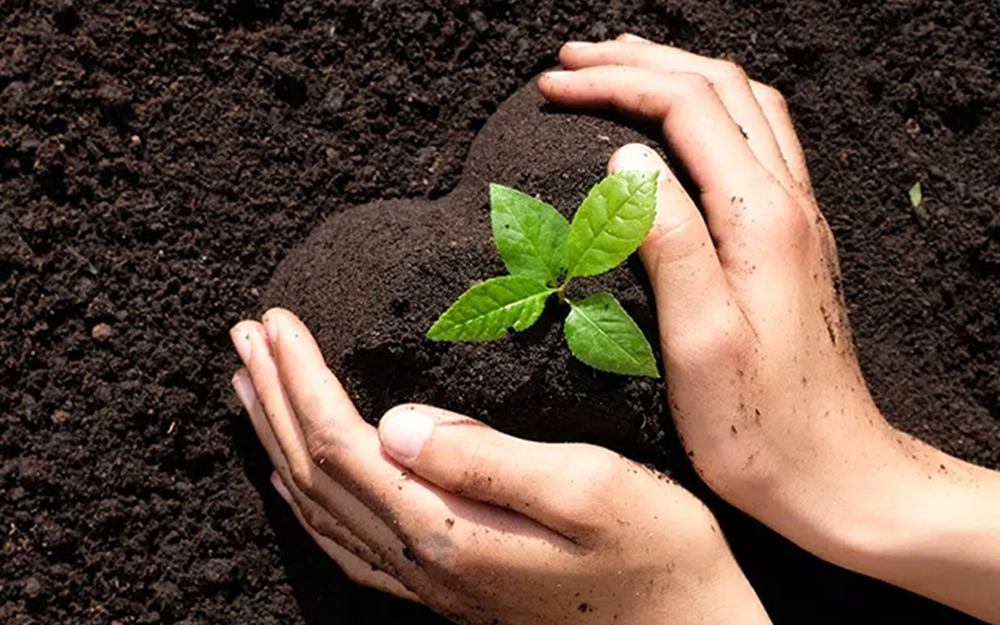
BY RUTH HILL R.N.
Spending time in nature is an intrinsic human need. Harvard entomologist and biodiversity expert E.O. Wilson coined the term “biophilia” to describe the “innate human tendency to focus on life and lifelike processes” and to bond with the natural world. “Our existence depends on this propensity,” Dr. Wilson wrote. “Our spirit is woven from it; hope rises on its currents.”
The beneficial effects of “nature therapy” extend to the central nervous system, autonomic nervous system, endocrine system, and immune system. Science says it’s good for our brains to play in parks or go camping; fish in oceans, lakes and streams; surf the waves and walk on the beach and take “forest baths.”
Healthy Soil Healthy Gut Healthy Brain
Healing gardens have been grown since ancient times, with earliest evidence of their existence found in Egypt, China, and the Aztec regions in Central Mexico. Later, the “apothecary,” gardens of the Middle Ages were training grounds for monks and physicians, who relied on plants for medicine.
Cannabis grown solely for potency and profit often lacks the nuanced qualities that make a truly exceptional cultivar. Growers who take shortcuts, use heavy chemicals or engage in unsavory business practices, may end up with weed that tastes of unflushed fertilizers and a “sinister vibe.”
Now research into gardening with Cannabis leaves may give cultivators a new experience in avoiding synthetic pesticides. In an interview with Ohio State News, Erick Martinez Rodriguez, a student in entomology, noted that “Mosquitoes are one of the deadliest animals in the world, mainly because as adults they serve as vectors of disease.”
Mosquitoes cause deadly and debilitating diseases, including malaria, West Nile virus, and heartworm. The yellow fever mosquito Aedes aegypti is a vector of several arboviruses of medical importance, including chikungunya, dengue, yellow fever, and Zika.
Natural Alternatives to Pesticides
Conventional synthetic insecticides are chemical tools for killing mosquito larvae populations, but overuse has led to both insecticide resistance and other negative environmental effects. Thus, the discovery of alternatives to synthetic pesticides, like biopesticides, is crucial to improving mosquito management.
Natural alternatives, such as extracts derived from plants, may serve as substitutes for traditional synthetic insecticides if they prove to be sustainable, cost-effective, and safe for non-target organisms. Hemp (Cannabis sativa) is a sustainable plant known to produce various secondary metabolites with insecticidal properties, including terpenoids and flavonoids. A recent study published in the Journal Insects found that hemp-derived cannabidiol (CBD) kills yellow fever mosquitoes in their larval phase within 48 hours of application.
Authentic CBD produced concentration-dependent mortality in pyrethroid-susceptible first-instar larvae within 48 hr. that reached 100% and was indistinguishable from hemp leaf extract when standardized for CBD concentration.
Our findings regarding the toxicity of CBD to mosquitoes align well with prior research suggesting CBD has toxic, antifeedant, and/or growth-inhibiting properties against other insects.
The present research has shown that hemp leaf extracts have toxic larvicidal activity against pyrethroid-susceptible and pyrethroid-resistant strains of the yellow fever mosquito. Moreover, CBD appears to be the principal active ingredient responsible for larvicidal activity.
“CBD is a compound that appears to be safe for people and our companion animals to ingest,” Piermarini said in the report. “It’ll be interesting to learn more about how CBD interacts with various proteins in mammals and insects to understand why it’s safe for people but not insects.”
Send comments to hilruth@gmail.com.









































